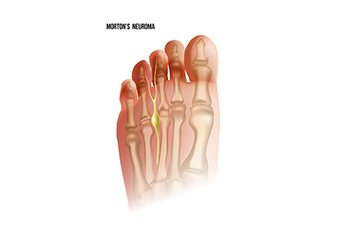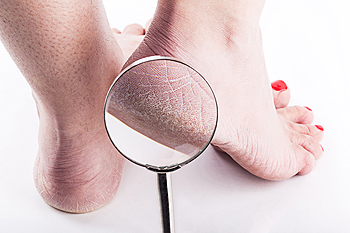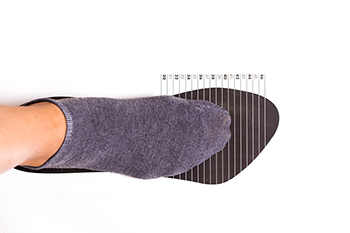Connect With Us
Blog
Items filtered by date: March 2023
Stylish but Painful High Heels

High heels can be stylish, and many women enjoy wearing them to enhance the appearance of their feet and legs, despite the pain they may cause. Research has shown it takes approximately one hour to feel the discomfort from wearing high heels, and a small percentage of people start to feel pain within minutes. There are several tendons, muscles and ligaments that are found in the feet and toes, and it is beneficial to stretch and strengthen the feet before wearing high heels. Choosing a shoe that has a lower heel may help to reduce any discomfort, while improving flexibility. Many women put insoles inside of their shoes, which can make the feet feel more comfortable. If you have questions about why you may have foot pain from wearing high heels, it is suggested that you confer with a podiatrist who can address any concerns you may have.
High heels have a history of causing foot and ankle problems. If you have any concerns about your feet or ankles, contact one of our podiatrists from Bangor Podiatry. Our doctors can provide the care you need to keep you pain-free and on your feet.
Effects of High Heels on the Feet
High heels are popular shoes among women because of their many styles and societal appeal. Despite this, high heels can still cause many health problems if worn too frequently.
Which Parts of My Body Will Be Affected by High Heels?
- Ankle Joints
- Achilles Tendon – May shorten and stiffen with prolonged wear
- Balls of the Feet
- Knees – Heels cause the knees to bend constantly, creating stress on them
- Back – They decrease the spine’s ability to absorb shock, which may lead to back pain. The vertebrae of the lower back may compress.
What Kinds of Foot Problems Can Develop from Wearing High Heels?
- Corns
- Calluses
- Hammertoe
- Bunions
- Morton’s Neuroma
- Plantar Fasciitis
How Can I Still Wear High Heels and Maintain Foot Health?
If you want to wear high heeled shoes, make sure that you are not wearing them every day, as this will help prevent long term physical problems. Try wearing thicker heels as opposed to stilettos to distribute weight more evenly across the feet. Always make sure you are wearing the proper shoes for the right occasion, such as sneakers for exercising. If you walk to work, try carrying your heels with you and changing into them once you arrive at work. Adding inserts to your heels can help cushion your feet and absorb shock. Full foot inserts or metatarsal pads are available.
If you have any questions please feel free to contact our offices located in Bangor, Gilbert, and Bethlehem, PA . We offer the newest diagnostic and treatment technologies for all your foot and ankle needs.
Morton’s Neuroma and High Heels

Morton’s neuroma is a foot condition that causes pain between the third and fourth toes. It affects the nerve in this area of the foot, and it may become enlarged and irritated. This can happen from wearing shoes that do not have enough room in the toe area to freely move in. High heels fit into this category, and can cause the toes to become cramped. Some of the symptoms that are felt with this condition can include a sensation that is likened to stepping on a marble or small pebble, and the area can feel like it is burning or numb. Relief may be found when appropriate shoes are worn, and it is beneficial to refrain from wearing high heels. The sooner the relief is found, the more of a chance a treatment method will be successful. This may include wearing orthotics that can support the shape of the foot, which may ultimately help in reducing existing irritation from the nerve. If you feel you may have Morton’s neuroma, it is suggested that you speak with a podiatrist who can confirm the diagnosis and offer effective treatment options.
Morton’s neuroma is a very uncomfortable condition to live with. If you think you have Morton’s neuroma, contact one of our podiatrists of Bangor Podiatry. Our doctors will attend to all of your foot care needs and answer any of your related questions.
Morton’s Neuroma
Morton's neuroma is a painful foot condition that commonly affects the areas between the second and third or third and fourth toe, although other areas of the foot are also susceptible. Morton’s neuroma is caused by an inflamed nerve in the foot that is being squeezed and aggravated by surrounding bones.
What Increases the Chances of Having Morton’s Neuroma?
- Ill-fitting high heels or shoes that add pressure to the toe or foot
- Jogging, running or any sport that involves constant impact to the foot
- Flat feet, bunions, and any other foot deformities
Morton’s neuroma is a very treatable condition. Orthotics and shoe inserts can often be used to alleviate the pain on the forefront of the feet. In more severe cases, corticosteroids can also be prescribed. In order to figure out the best treatment for your neuroma, it’s recommended to seek the care of a podiatrist who can diagnose your condition and provide different treatment options.
If you have any questions, please feel free to contact our offices located in Bangor, Gilbert, and Bethlehem, PA . We offer the newest diagnostic and treatment technologies for all your foot care needs.
Cracked Heels in Men and Women

Cracked heels are a relatively common condition of the foot in which the heels become so severely dehydrated that the skin can essentially crack or form fissures. Fortunately, many different cases of cracked heels are relatively harmless and merely look unsightly. Many newcomers to the field of podiatry often wonder whether cracked heels affect women and men in different ways. The answer is somewhat complicated. Even though about 20% of all adults in the United States have developed cracked heels, women are about 50% more likely than men to report to their medical professional that they have cracked heels. So, therefore, the answer is not straightforward. Just because women are more likely to report cracked heels does not mean that they experience it more than men do. If you are someone that struggles with cracked heels, it is suggested that you contact a podiatrist for treatment or to answer any of your questions.
Cracked heels are unsightly and can cause further damage to your shoes and feet. If you have any concerns, contact one of our podiatrists from Bangor Podiatry. Our doctors can provide the care you need to keep you pain-free and on your feet.
Cracked Heels
Cracked heels appear unappealing and can make it harder for you walk around in sandals. Aside from looking unpleasant, cracked heels can also tear stockings, socks, and wear out your shoes. There are several methods to help restore a cracked heel and prevent further damage.
How Do You Get Them?
Dry skin is the number one culprit in creating cracked heels. Many athletes, walkers, joggers, and even swimmers suffer from cracked heels. Age and skin oil production play a role to getting cracked heels as well.
Promote Healing
Over the counter medicines can help, especially for those that need instant relief or who suffer from chronic dry feet.
Wear Socks – Wearing socks with medicated creams helps lock in moisture.
Moisturizers – Applying both day and night will help alleviate dryness which causes cracking.
Pumice Stones – These exfoliate and remove dead skin, which allows for smoother moisturizer application and better absorption into the skin.
Change in Diet
Eating healthy with a well-balanced diet will give the skin a fresh and radiant look. Your body responds to the kinds of food you ingest. Omega-3 fatty acids and zinc supplements can also revitalize skin tissue.
Most importantly, seek professional help if unsure how to proceed in treating cracked heels. A podiatrist will help you with any questions or information needed.
If you have any questions, please feel free to contact our offices located in Bangor, Gilbert, and Bethlehem, PA . We offer the newest diagnostic and treatment technologies for all your foot care needs.
Helpful Tips When Buying Shoes

The feet are often taken for granted, and this includes choosing shoes that fit correctly. It is crucial that shoes are comfortable as they are tried on, and a break-in period is generally frowned upon. Many foot conditions occur as a result of wearing shoes that are too tight, often affecting the toes. These can include Morton’s neuroma, bunions, and corns. Relief is often found when shoes that are worn fit properly, and the conditions may gradually diminish. There are helpful tips when purchasing new shoes, including trying them on at the end of the day when the feet are at their largest. Many people think their feet are one size, however, all shoes are not constructed equally, and the size may vary slightly. Trying shoes and walking in them will help you to determine if the shoe is right for you. This can help to provide an easy fit, and blisters and calluses may be avoided. If you would like more information about how to choose the right shoe size, it is suggested that you speak with a podiatrist who can answer any questions you may have.
Getting the right shoe size is an important part of proper foot health. Seek the assistance of one of our podiatrists from Bangor Podiatry. Our doctors will provide the care you need to keep you pain-free and on your feet.
Getting the Right Shoe Size
There are many people who wear shoes that are the incorrect size, negatively affecting their feet and posture. Selecting the right shoes is not a difficult process, so long as you keep several things in mind when it comes to choosing the right pair.
- When visiting the shoe store, use the tools available to measure your foot.
- Be sure there is ‘wiggle room’. There should be about an inch between your toes and the tip of your shoes.
- Do not always assume you are the same size, as manufacturers run differently.
- Purchase shoes later in the day, as your feet swell as the day progresses.
- If a shoe is not comfortable, it is not suitable. Most shoes can’t be ‘broken in’, and comfort should be the ultimate goal when it comes to choosing the right pair of shoes
As our feet hold our body weight and keep us moving, it is important to treat them right. Picking the right pair of shoes can provide your feet comfort and mobility without pain.
If you have any questions, please feel free to contact our offices located in Bangor, Gilbert, and Bethlehem, PA . We offer the newest diagnostic and treatment technologies for all your foot care needs.
Blog Archives
- June 2025
- May 2025
- April 2025
- March 2025
- February 2025
- January 2025
- December 2024
- November 2024
- October 2024
- September 2024
- August 2024
- July 2024
- June 2024
- May 2024
- April 2024
- March 2024
- February 2024
- January 2024
- December 2023
- November 2023
- October 2023
- September 2023
- August 2023
- July 2023
- June 2023
- May 2023
- April 2023
- March 2023
- February 2023
- January 2023
